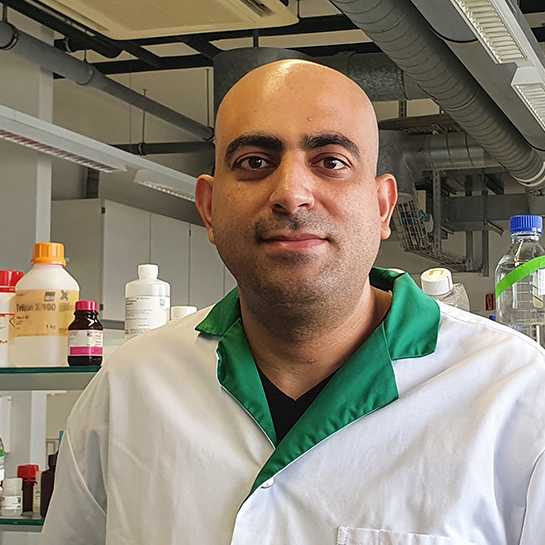"With your application you can demonstrate your scientific maturity and independence"
Mohamed Mahameed, a postdoctoral researcher in the Biotechnology and Bioengineering group of Martin Fussenegger, did his doctorate at the Hebrew University of Jerusalem, Israel. A fellowship from the European Molecular Biology Organisation (EMBO) then offered him the opportunity to transition from basic research to applied bioengineering. In his project, he investigated how to speed up the insulin secretion of genetically modified cells for diabetes therapies.
What is the EMBO fellowship, what does it include and what does it offer?
EMBO is supporting internationally mobile postdoctoral researchers in Europe and around the world. It offers two years of salary plus relocation and child allowances. Applying for this prestigious fellowship is a great opportunity and great learning, especially as you can demonstrate your scientific maturity and independence. Also, you have to come up and write a novel research proposal. In addition, this fellowship gives you some financial security.
What is the application process for the EMBO fellowship?
A prerequisite is that you have finished your PhD. And, for the application, you have to submit an original research plan. For that I contacted Martin and we discussed potential ideas for the research project. To decide what research I wanted to do I put together my research proposals. Finally, for the application you need a confirmation from the hosting lab, and Martin supported my application.
Beside financial support the EMBO fellowship offers a lot more: it includes access to a network of researchers, mentors, courses…
Yes, in fact EMBO offers a lot of courses in a large variety of topics. In addition, EMBO asks for obligatory participation in some online courses, including good lab practice, code-of-conduct in research, data handling, and project management. In addition, EMBO organises different types of conferences where you can present and share your project with other researchers from around the world.

“When I moved to Switzerland for my postdoc I decided to apply my knowledge from basic research on synthetic biology and therapeutic designs, learning how to develop tools in bioengineering. In particular, my goal was to shorten the activation time in genetically modified cells so that they can secrete proteins of interest within a very short time, ie., within 20 min after their stimulation, a requirement for diabetes therapy.”Mohamed Mahameed, Biotechnology and Bioengineering Lab, D-BSSE
Your application included a detailed research plan. What is your research about?
I come from a different background. During my doctorate at the Hebrew University of Jerusalem, I focussed on the endoplasmatic reticulum (ER) and did some basic research investigating the mechanism and properties of protein folding and their equality control in the ER. When I moved to Switzerland for my postdoc I decided to apply my knowledge from basic research on synthetic biology and therapeutic designs, learning how to develop tools in bioengineering. In particular, my goal was to shorten the activation time in genetically modified cells so that they can secrete proteins of interest within a very short time, ie., within 20 min after their stimulation, which is a requirement for the diabetes therapy. This project yielded three main publications: two have already been published, and the final publication is in its final stage of submission.
You came from the Hebrew University of Jerusalem. Coming here was a great decision and a big step since you relocated with your wife and daughter. Why did you decide on Switzerland, and what made you come to D-BSSE?
I knew Martin from his publications. And, he was also an editor of the journal where I submitted some of my papers during my PhD. Also, coming to Switzerland was a joint decision made with my wife. You know, in Israel we are used to a very heterogeneous population, we have a great variability in cultures and religions, I could even say: we have a very European-like culture and living style. We personally like very much the European culture and the living style, so we decided to come here. In Switzerland, people are very friendly and very helpful, and the working environment is very international. Of course, I also have a good relationship with Martin who is very supportive.
What is your long-term vision for your career…?
I want to pursue a career in academia. I applied for a Tenure Track position, and just two weeks ago I got offered a group leader / PI position at the Hebrew University of Jerusalem. I will start this new position in June 2024. I hope I keep in touch with Martin and other colleagues here to collaborate in the near future with the D-BSSE.
Congratulations, Mohamed, to your new position, and thank you for being with us today. We wish you all the very best for you and your family!
This interview took place during the D-BSSE Digital Campus held on 21 February 2023.
Find information on the external page EMBO postdoctoral fellowship (applications accepted throughout the year).
Learn about research in the Biotechnology and Bioengineering group led by Martin Fussenegger.